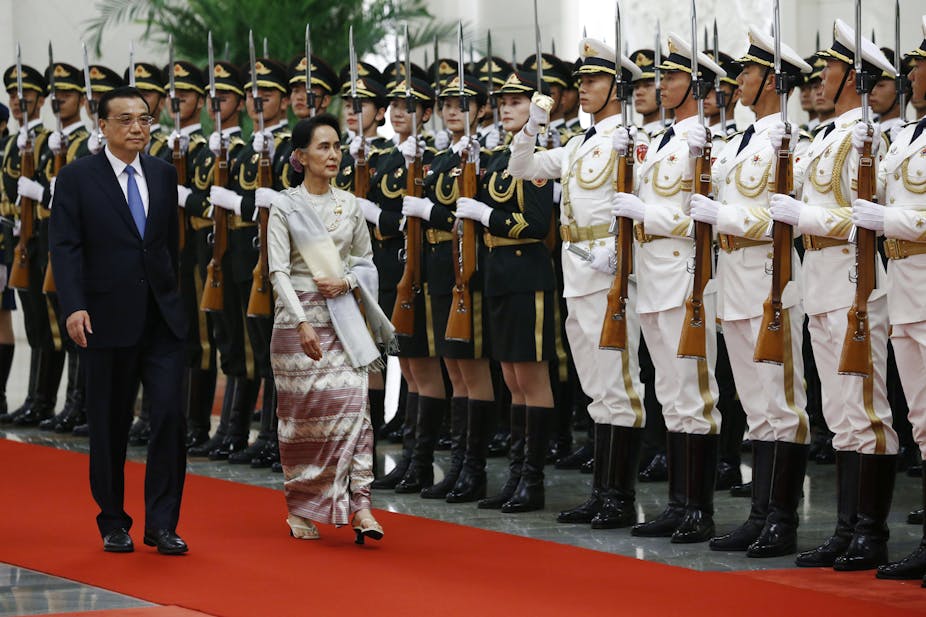As the Myanmar government’s violent policy towards its Rohingya Muslims drew increasing international condemnation in 2016, the country’s sometime icon of democracy, Aung San Suu Kyi, declined to speak out for the persecuted minority. And in her attempts to protect Myanmar from renewed isolation, she has continued to deepen its relationship with her most powerful authoritarian neighbour: China. It seems the common notion that newly democratic states have little time for autocratic partners is false.
Before the West started paying real attention to the Rohingya crisis, Myanmar’s democratic transition was something of a cause celebre. But in reality, the country is still under military sway, and the democratic West is still less influential in Myanmar than China. Beijing’s interests are still a decisive economic influence in the country, which is clearly a potentially crucial partner in China’s gargantuan Belt and Road initiative.
To be sure, China is just one of Myanmar’s heavyweight international protectors, which also include Russia and India. These three countries all share certain urgent concerns, among them the threat of militant radical Islamism. Connections have been drawn between Rohingya militants and Pakistani extremist groups such as Jaish-e-Mohammed, this just as Beijing is increasing pressure on Pakistan to curb its support for fundamentalist groups that could threaten Chinese interests in Asia.
As it surveys this troubling map – which also includes an insurgency among the Uighur Muslims of China’s own Xinjiang province – Beijing views Myanmar’s crackdown not as a domestic problem for a junior partner, but as another front in a wider struggle for stability.
And just as Myanmar fits into that particular Chinese strategy, it also has a part to play in various others.
The Chinese way
This is a style of geopolitical influence China is pursuing the world over. Its current foreign policy in Asia follows a similar pattern to its policies in Africa, which revolve heavily around infrastructure and development assistance as well as commodity extraction. It is still open to question whether these policies will benefit African states in the long term, but what cannot be denied is that China has had a significant impact on the continent in a comparatively short period of time.
Many critics of China’s African policies point to Beijing’s support for authoritarian and violent regimes such as Sudan’s, which it backed during much of the Darfur massacre in the 2000s. And even democratic shifts in government do not necessarily turn African states away from Chinese influence.
After sweeping into power on a wave of anti-Chinese populism in 2011, Zambia’s late Michael Sata appeared to spell trouble for Chinese interests in his country. He even threatened to recognise Taiwan – a direct affront to Beijing, which regards Taiwan as a wayward province. But in the end, Sata did not act on his threats, instead endorsing his country’s Chinese ties.

What does this tell us about China’s approach to Myanmar and countries like it? As with the expectations of Myanmar’s transition to democracy, it is not always certain that a more democratic regime will turn away from Beijing. It seems China has become too powerful for most countries to ignore on principle.
This is only helped by Chinese foreign policy’s remarkable consistency. Besides pursuing the Belt and Road initiative, which extends across much of Asia and well into Europe, China is carefully cultivating cadres of friendly states in its “near abroad”, whether in the post-Soviet sphere or Southeast Asia.
This also explains China’s support for North Korea in the face of a war of words between Donald Trump and Kim Jong-un. While that policy has often been held up as an example of Beijing’s inability to control Pyongyang, it is equally an expression of China’s relative strength: as things stand, any Western moves to counter North Korea would be impossible without Beijing’s assistance.
Then there’s the matter of the South China Sea. Once seen as an “American lake”, China now lays claim to the sea almost in its entirety, and not just for its own sake; as political theorist John Mearsheimer once argued in The Tragedy of Great Power Politics, aspiring superpowers often seek to dominate in their sphere of influence before becoming a global power.
So as far as China is concerned, the ongoing Rohingya crisis is just one of many developments in Asia where it has key interests at stake. It will not allow the world’s growing impatience and outrage at the Myanmar government’s behaviour to undermine what’s become a remarkably coherent foreign policy – not a mercenary venture, but a carefully planned great game.

